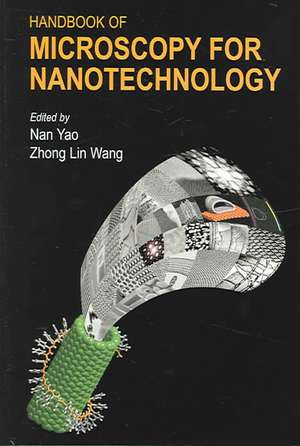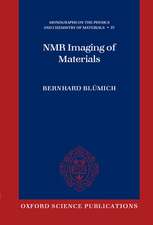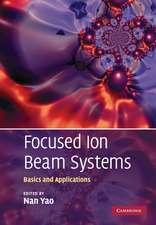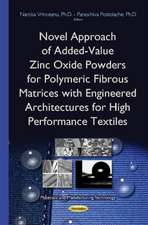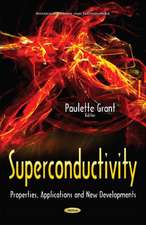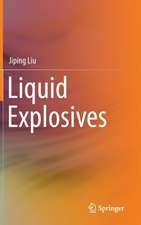Handbook of Microscopy for Nanotechnology
Editat de Nan Yao, Zhong Lin Wangen Limba Engleză Hardback – 20 mar 2005
Preț: 1221.40 lei
Preț vechi: 1489.51 lei
-18% Nou
Puncte Express: 1832
Preț estimativ în valută:
233.77€ • 243.65$ • 194.61£
233.77€ • 243.65$ • 194.61£
Carte tipărită la comandă
Livrare economică 06-20 ianuarie 25
Preluare comenzi: 021 569.72.76
Specificații
ISBN-13: 9781402080036
ISBN-10: 1402080034
Pagini: 768
Ilustrații: XX, 731 p.
Dimensiuni: 155 x 235 x 46 mm
Greutate: 1.59 kg
Ediția:2005
Editura: Springer Us
Colecția Springer
Locul publicării:New York, NY, United States
ISBN-10: 1402080034
Pagini: 768
Ilustrații: XX, 731 p.
Dimensiuni: 155 x 235 x 46 mm
Greutate: 1.59 kg
Ediția:2005
Editura: Springer Us
Colecția Springer
Locul publicării:New York, NY, United States
Public țintă
ResearchDescriere
Nanostructured materials take on an enormously rich variety of properties and promise exciting new advances in micromechanical, electronic, and magnetic devices as well as in molecular fabrications. The structure-composition-processing-property relationships for these sub 100 nm-sized materials can only be understood by employing an array of modern microscopy and microanalysis tools. Handbook of Microscopy for Nanotechnology aims to provide an overview of the basics and applications of various microscopy techniques for nanotechnology. This handbook highlights various key microcopic techniques and their applications in this fast-growing field. Topics to be covered include the following: scanning near field optical microscopy, confocal optical microscopy, atomic force microscopy, magnetic force microscopy, scanning turning microscopy, high-resolution scanning electron microscopy, orientational imaging microscopy, high-resolution transmission electron microscopy, scanning transmission electron microscopy, environmental transmission electron microscopy, quantitative electron diffraction, Lorentz microscopy, electron holography, 3-D transmission electron microscopy, high-spatial resolution quantitative microanalysis, electron-energy-loss spectroscopy and spectral imaging, focused ion beam, secondary ion microscopy, and field ion microscopy.
Cuprins
Optical Microscopy, Scanning Probe Microscopy, Ion Microscopy and Nanofabrication.- Confocal Scanning Optical Microscopy and Nanotechnology.- Scanning Near-Field Optical Microscopy in Nanosciences.- Scanning Tunneling Microscopy.- Visualization of Nanostructures with Atomic Force Microscopy.- Scanning Probe Microscopy for Nanoscale Manipulation and Patterning.- Scanning Thermal and Thermoelectric Microscopy.- Imaging Secondary Ion Mass Spectrometry.- Atom Probe Tomography.- Focused Ion Beam System—a Multifunctional Tool for Nanotechnology.- Electron Beam Lithography.- Electron Microscopy.- High-Resolution Scanning Electron Microscopy.- High Spatial Resolution Quantitative Electron Beam Microanalysis for Nanoscale Materials.- Characterization of Nano-Crystalline Materials Using Electron Backscatter Diffraction in the Scanning Electron Microscope.- High Resolution Transmission Electron Microscopy.- Scanning Transmission Electron Microscopy.- In-Situ Electron Microscopy for Nanomeasurements.- Environmental Transmission Electron Microscopy in Nanotechnology.- Electron Nanocrystallography.- Tomography Using the Transmission Electron Microscope.- Off-Axis Electron Holography.- SUB-NM Spatially Resolved Electron Energy-Loss Spectroscopy.- Imaging Magnetic Structures Using TEM.
Recenzii
From the reviews:
"Nanostructured materials have a rich variety of properties … . This complete reference provides a thorough treatment of these techniques and their applications." (Materials Today, 2005)
"Nanostructured materials have a rich variety of properties … . This complete reference provides a thorough treatment of these techniques and their applications." (Materials Today, 2005)
Caracteristici
Written by experts in the field
Provides thorough treatment of the most appropiate microscopy techniques of importance to studying nanostructured materials
Includes supplementary material: sn.pub/extras
Provides thorough treatment of the most appropiate microscopy techniques of importance to studying nanostructured materials
Includes supplementary material: sn.pub/extras
